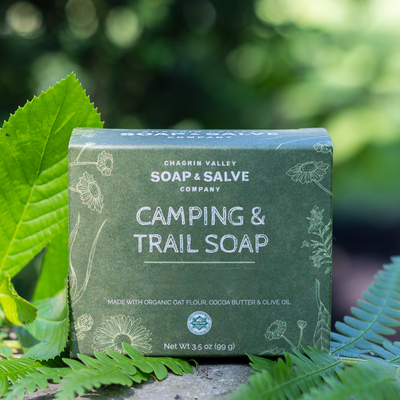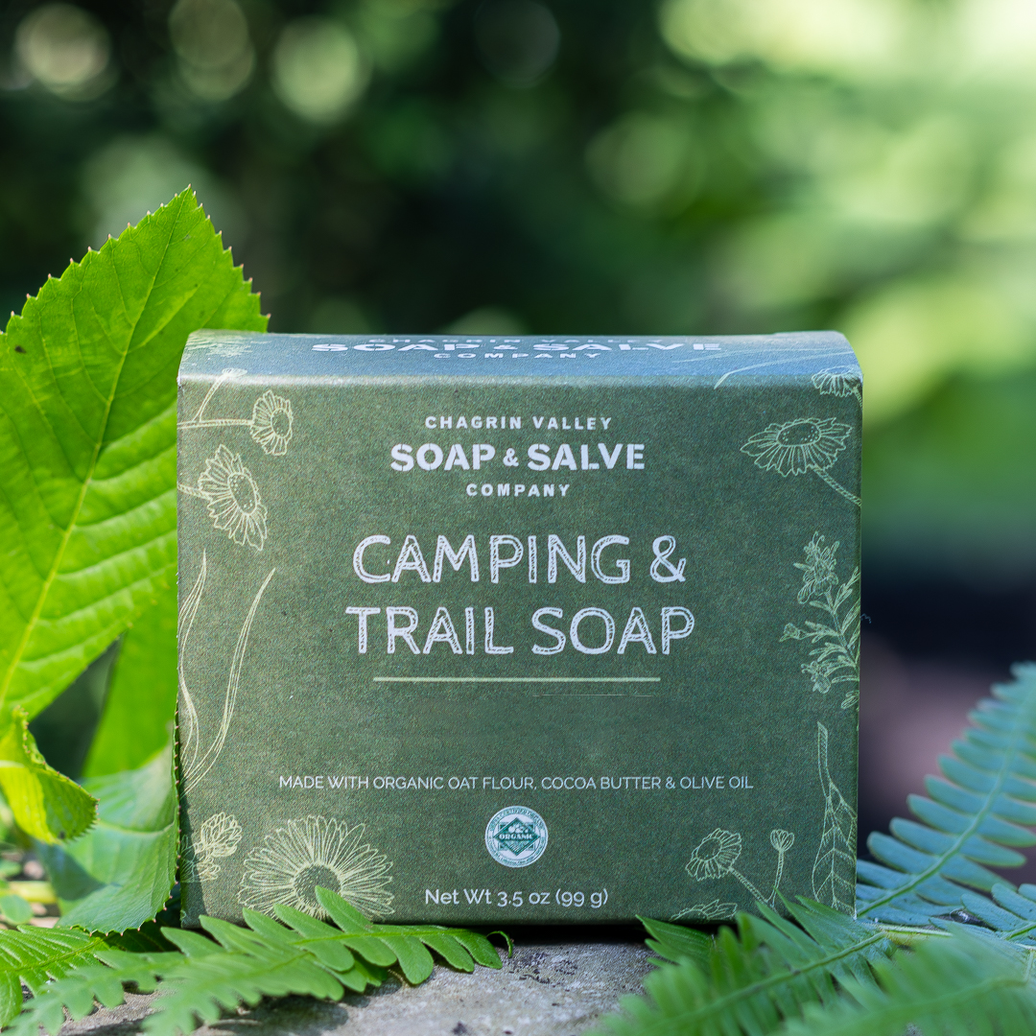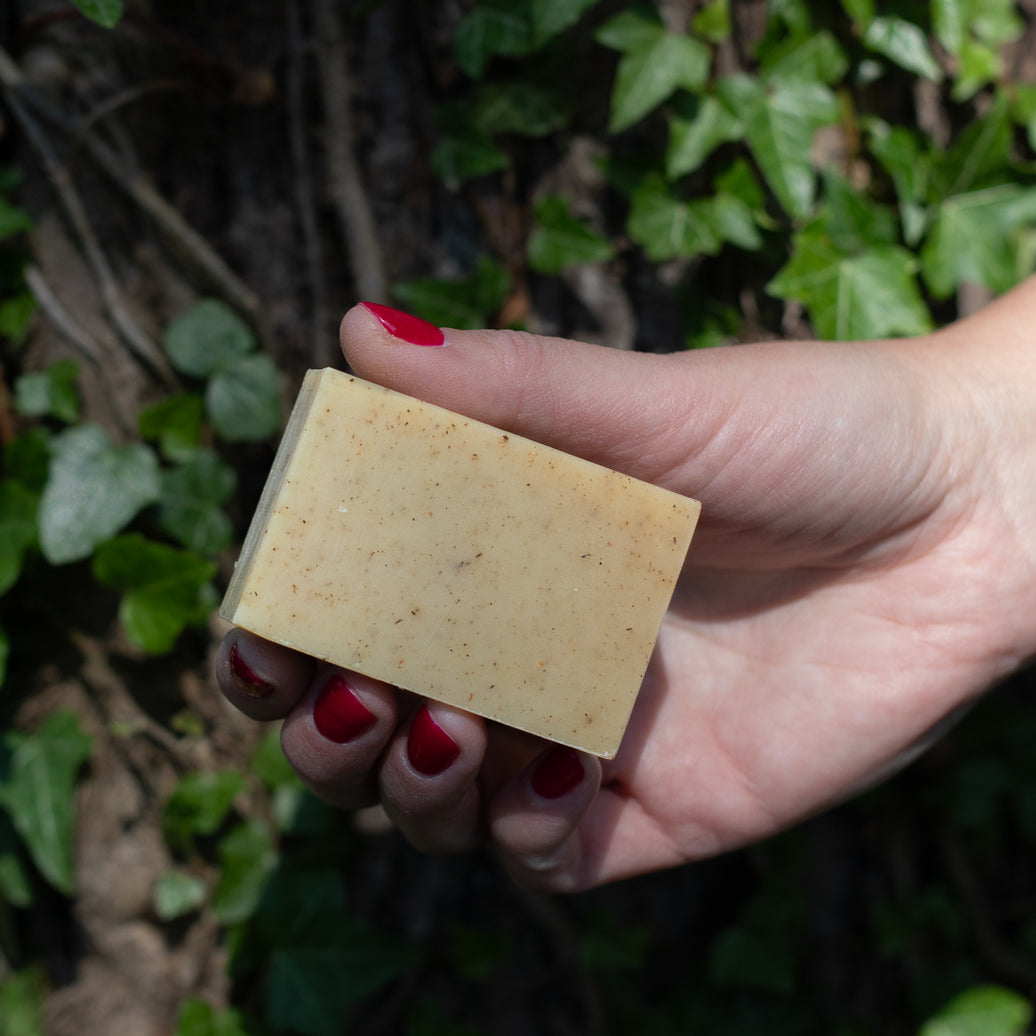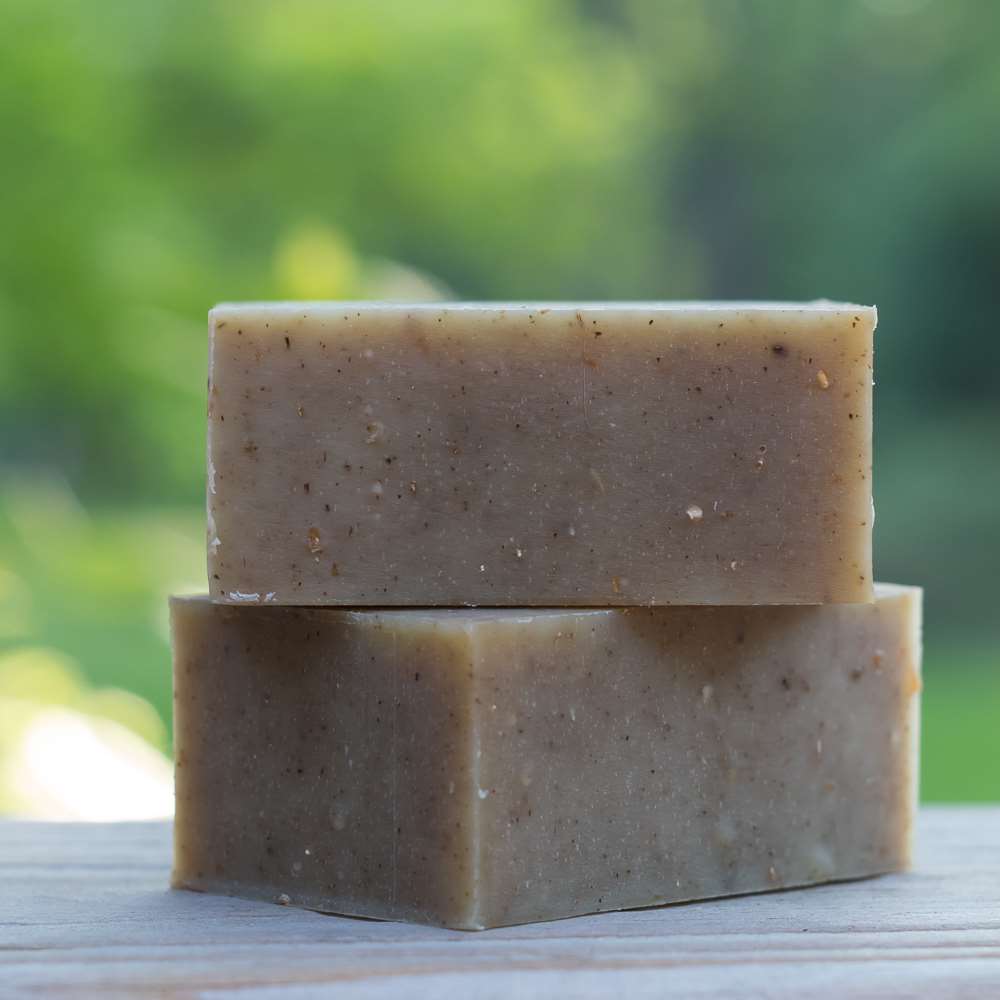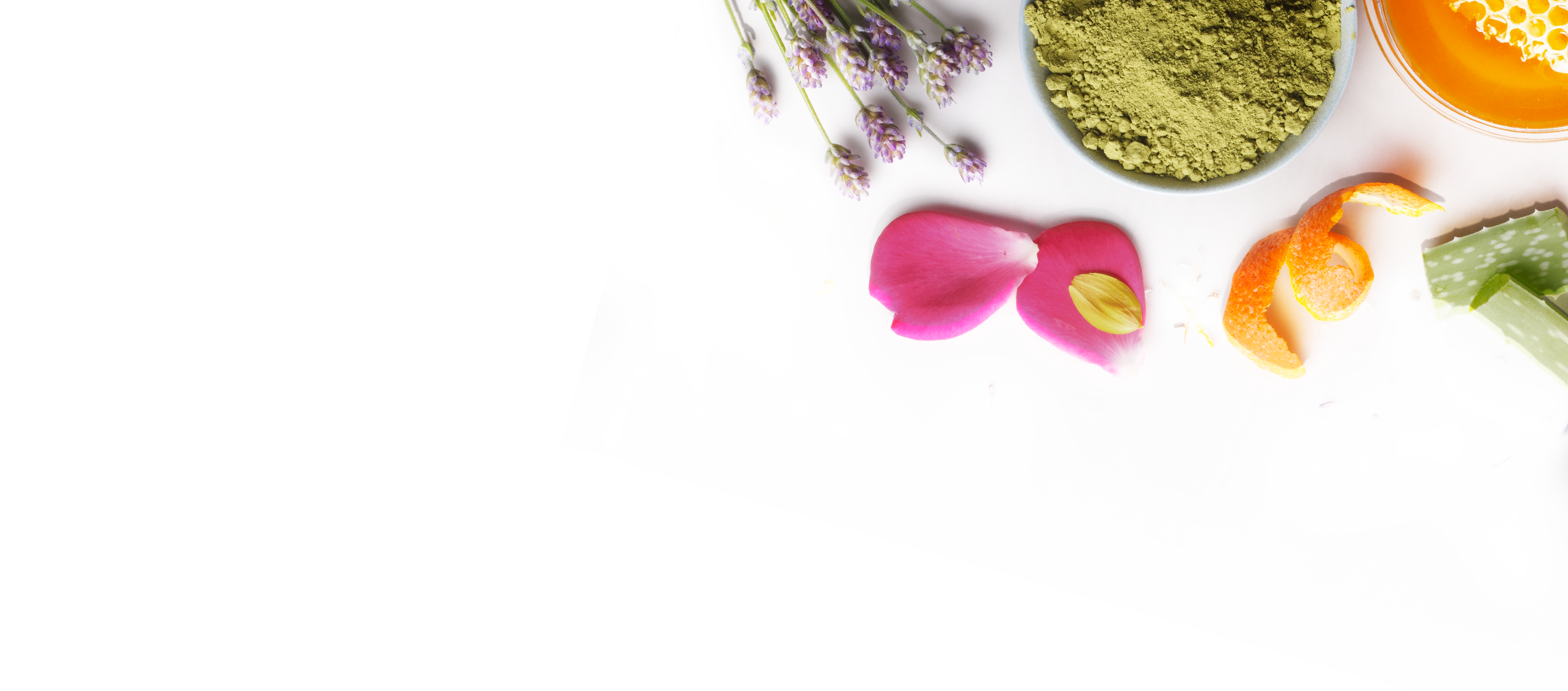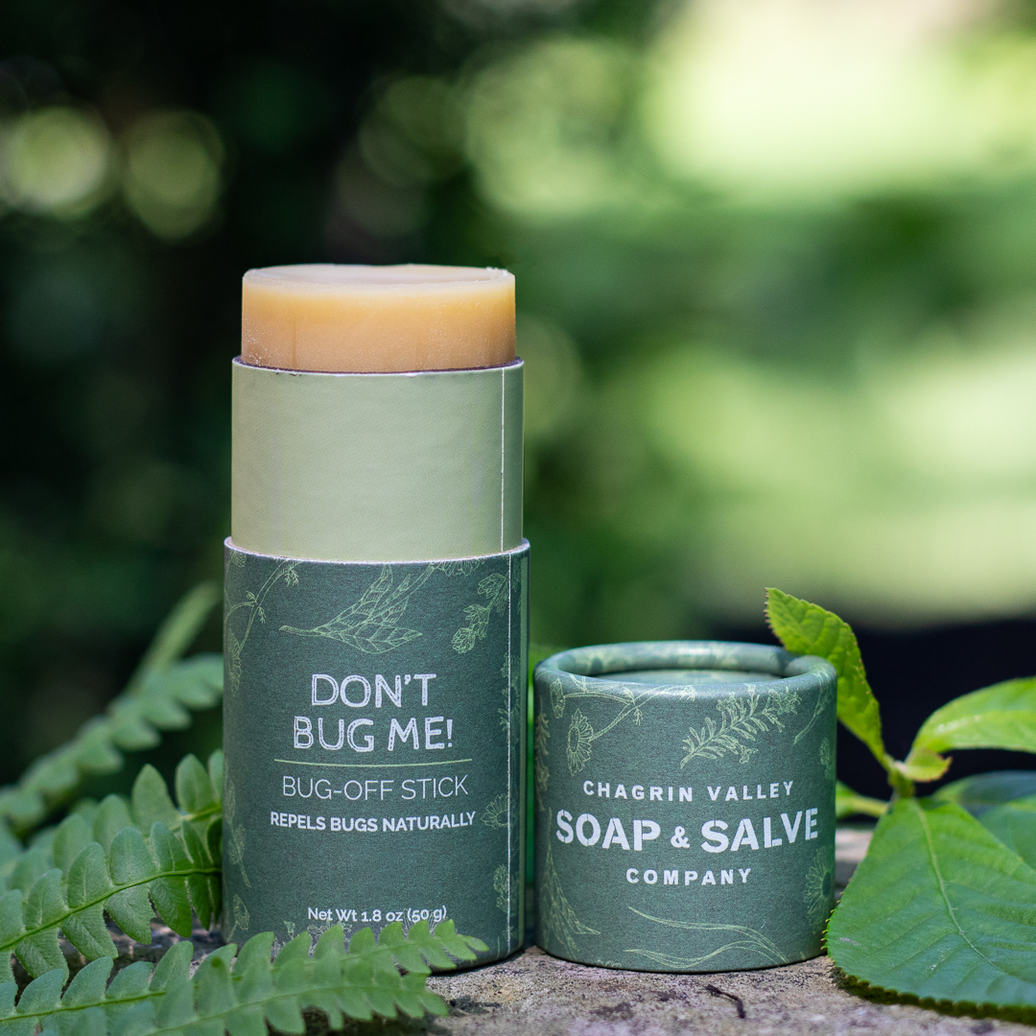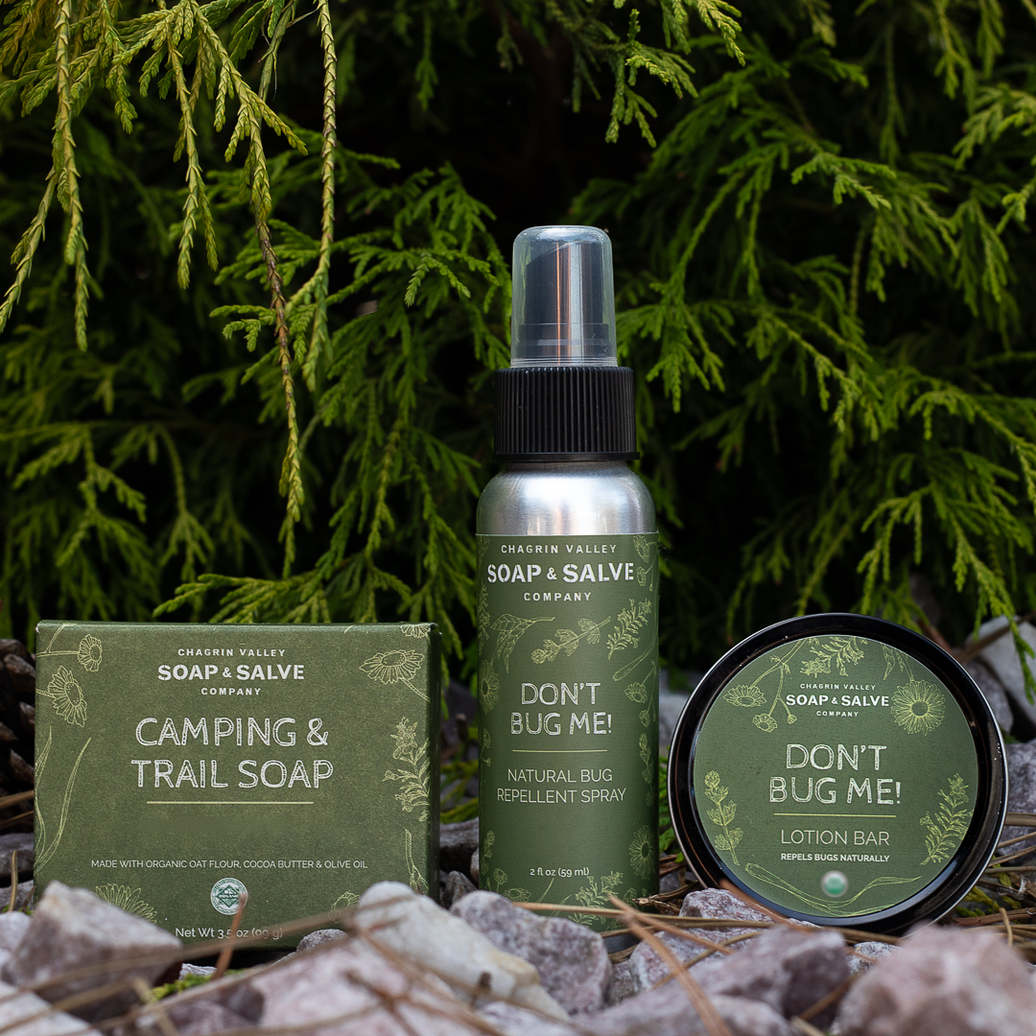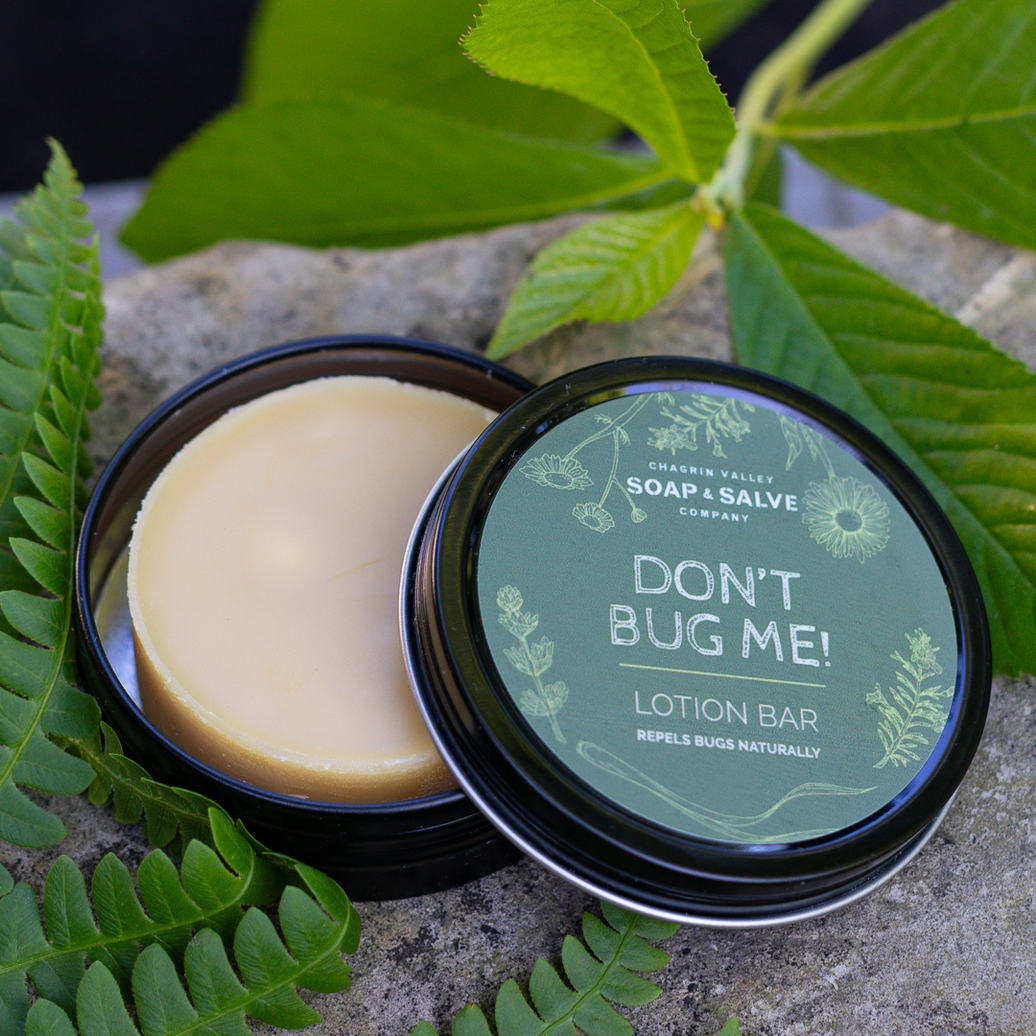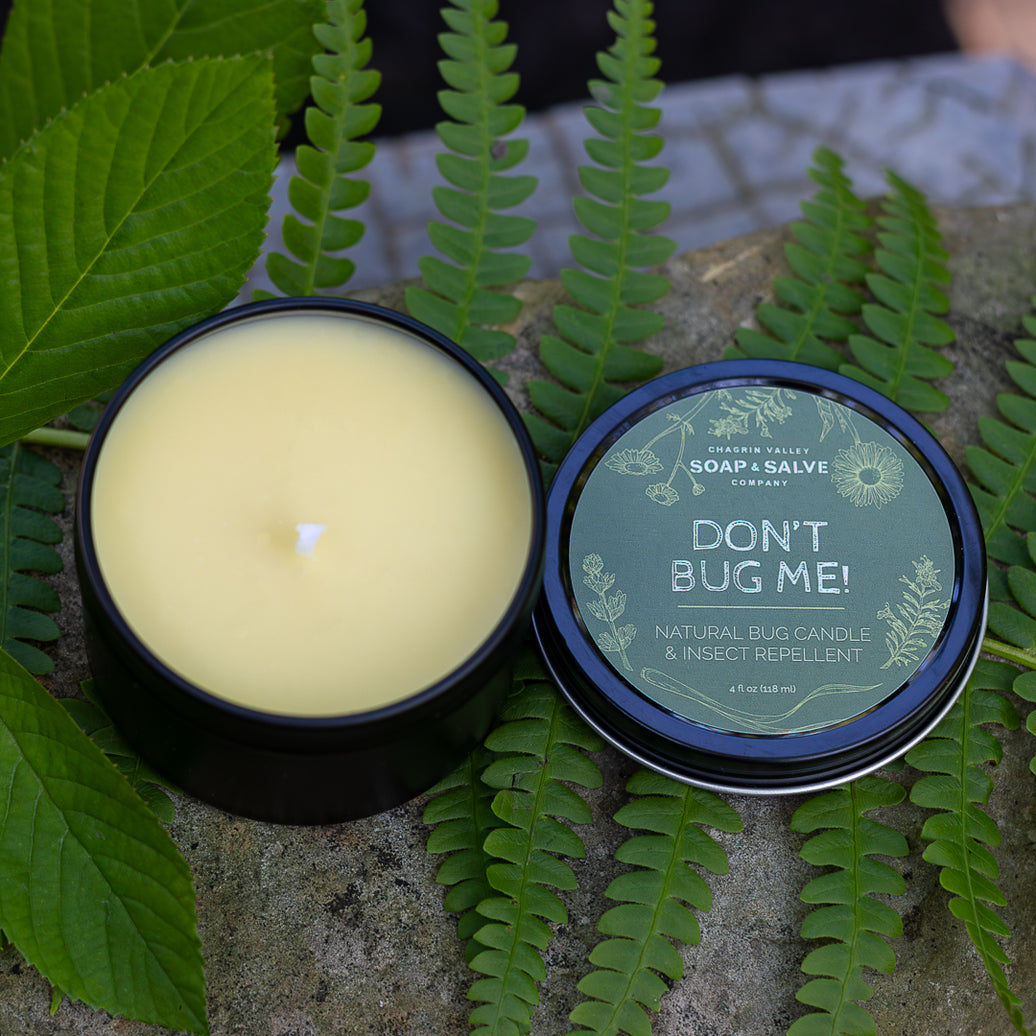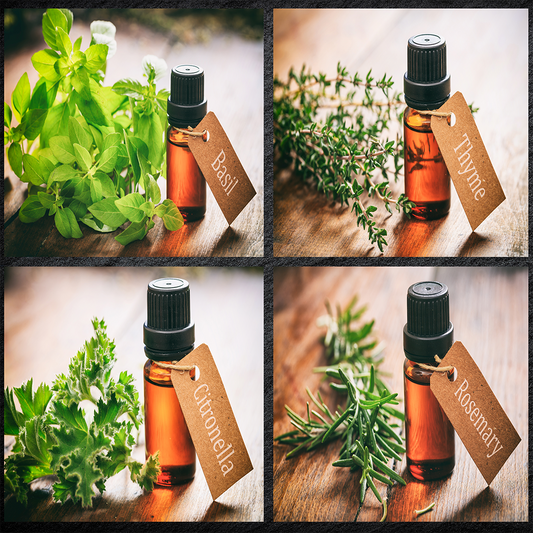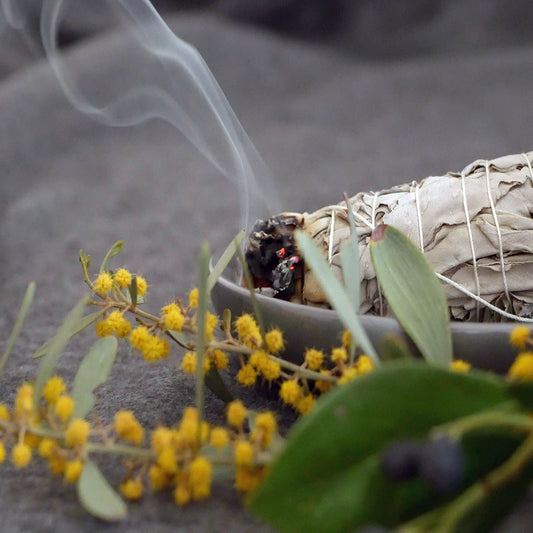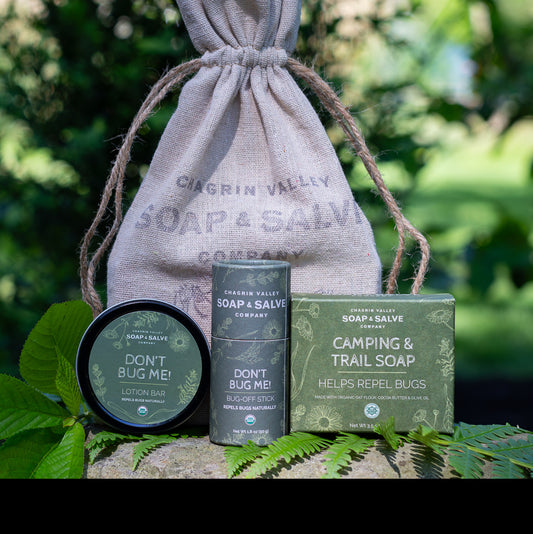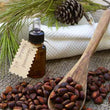
Natural Soap: Camping & Trail Bar
Natural Soap: Camping & Trail Bar
Our natural biodegradable camping soap is gentle on the skin and the environment. We infuse this moisturizing soap with a well-balanced blend of woodsy essential oils. Bring a bar along on your next camping or backpacking trip.
- Out Of Stock






Product Overview
Our natural camping soap is great for those who love to spend time in the outdoors. Whether you are camping, fishing, or hiking our cold process soap will nourish your skin and be kind to our environment.
Our compact Camping & Trail is biodegradable and when used properly, is safe to use at campsites near bodies of water.
Learn More Blog: Biodegradable Soap? Are Chagrin Valley Natural Soaps and Shampoo Bars Biodegradable?
Jump in the shower before heading out for a hike or picnic or bring a bar along on your next camping or backpacking (see "How to Use" below)
- May help with poison ivy exposure (see "How to Use" below)
- Enriched with organic cocoa butter and nourishing plant oils
- Organic oat flour helps soothe skin
Our nicely balanced blend of essential oils includes the woodsy aromas of Citronella, Lemongrass, Cedarwood and Rosemary, for a fresh outdoorsy scent.
How To Use
Camping, Hiking, Gardening, etc:
- We recommend showering with our camping soap before going outdoors.
- You may also carry a bar with you and apply to pulse points throughout the day.
- Your natural body heat will help release the scent blend into the air.
- You can even use this versatile bar as a shampoo.

Poison Ivy: Old fashioned lye soap has been used for years to help with poison ivy exposure. The rash from poison ivy is due to a naturally occurring oil and invisible oil called urushiol that can be found in every part of the poison ivy plant from leaves, to sap, to stems, to roots. Urushiol is the same substance that causes a rash from poison sumac and poison oak.
To prevent poison ivy rashes you need to remove the oily urushiol from your skin within an hour or two after exposure. Timely urushiol removal can prevent poison ivy skin reaction.
Use cool water, soap and the friction of a washcloth to thoroughly clean the exposed area.
If water source is not available, sprinkle a few drops of water from your water bottle onto the bar and rub it over the exposed area—just be sure to rinse off the bar so that you do not spread the irritating Urushiol oil of the poison ivy plant.
You can also mash a small amount of the soap with cool water and apply the paste to the exposed area until it can be washed.
Bring a bar along on your next camping or backpacking trip to use as a body soap, shave soap, and shampoo so the scent will linger in your hair. There are many soap makers out there with good intentions who claim that their biodegradable soap or shampoo is safe to use in rivers and streams. However, even biodegradable soap can eventually pollute lakes and streams if it is not used sparingly.
The bacteria that break down natural soap are present mostly in the soil. That means that when you wash, please be sure that your soapy rinse water ends up in the soil away from freshwater sources like lakes, rivers, and streams.
Learn More Blog: Biodegradable Soap? Are Chagrin Valley Natural Soaps and Shampoo Bars Biodegradable?
There’s no substitute for nature. Together we can protect it from impacts like overuse, trash, and harming endangered wildlife by following the principles of "Leave No Trace."
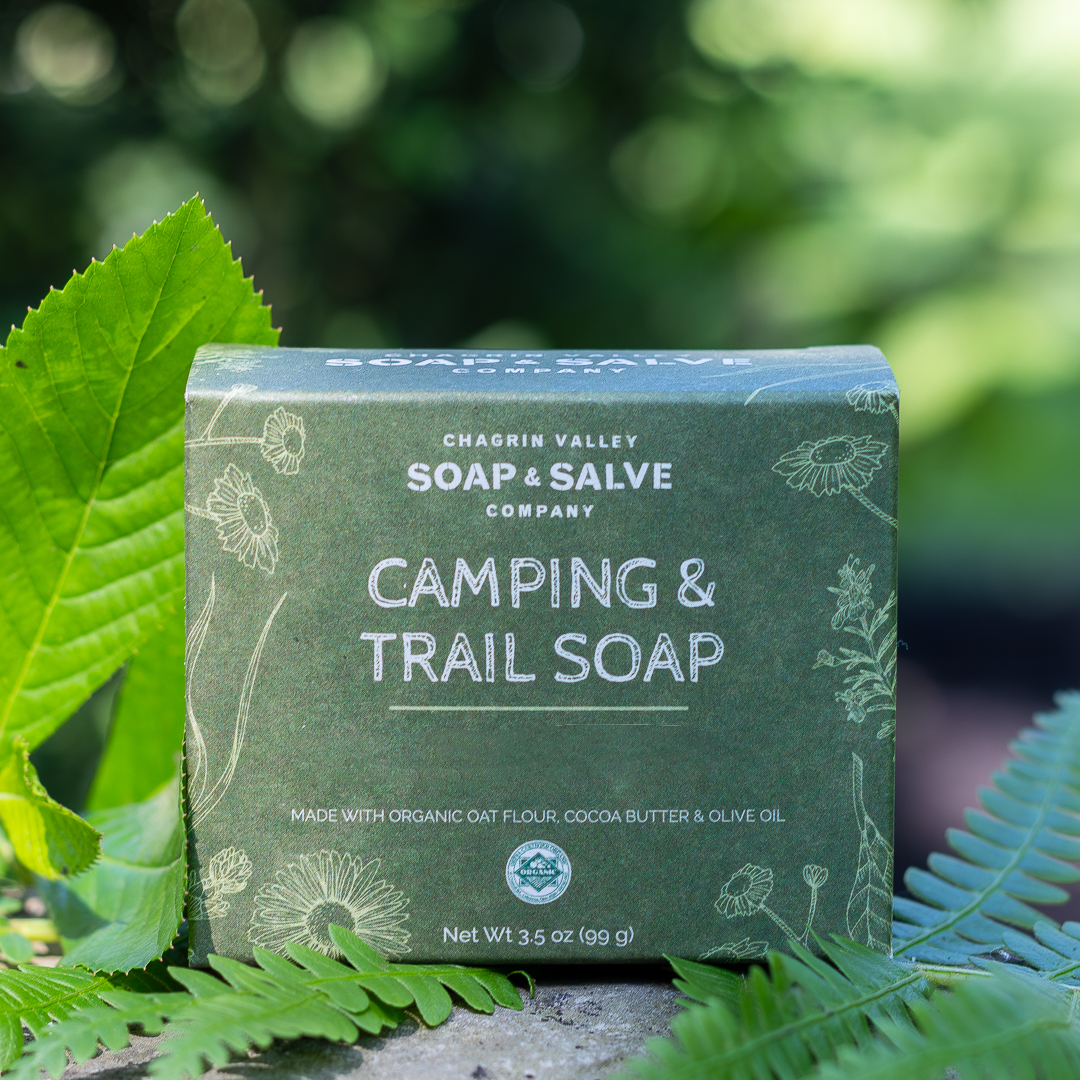
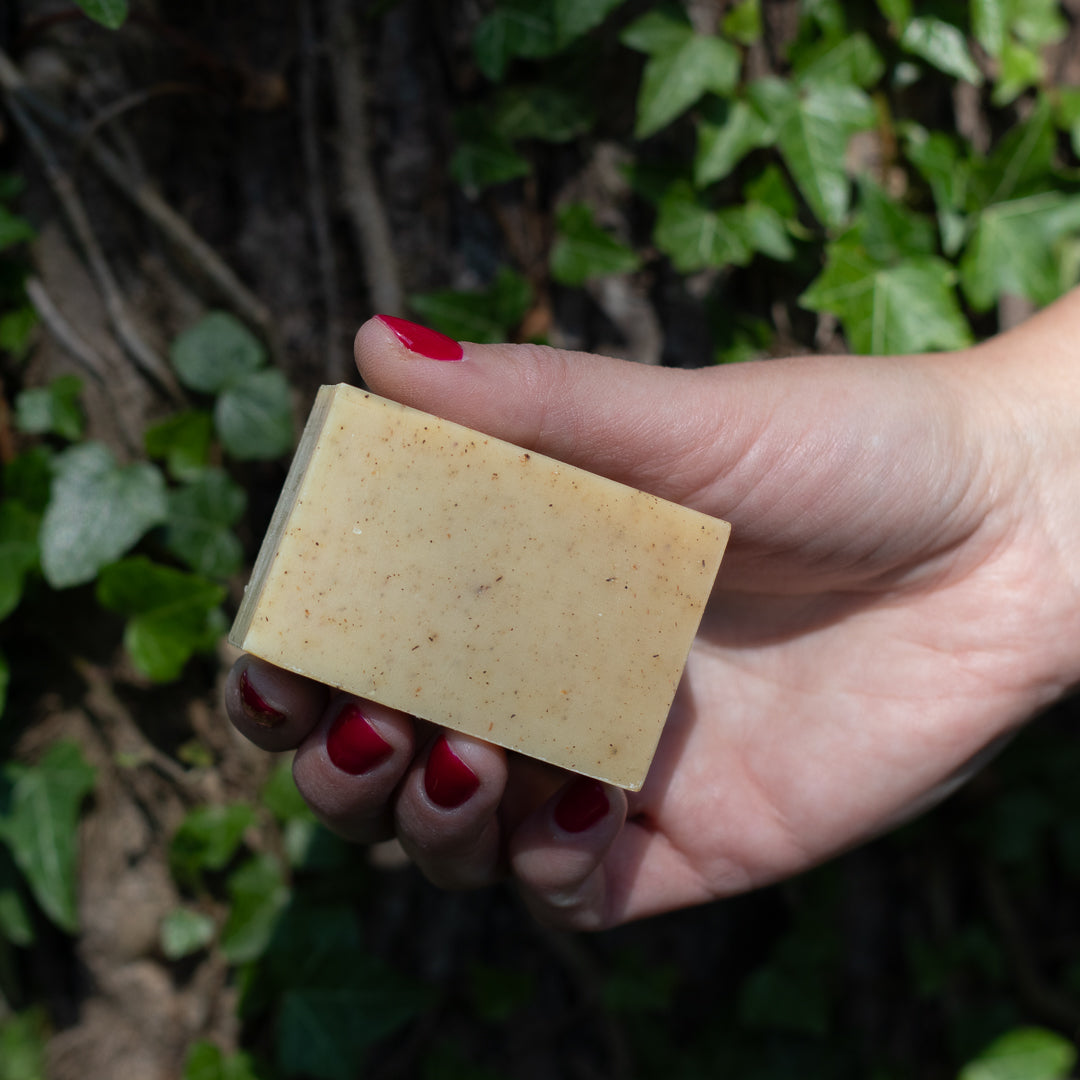
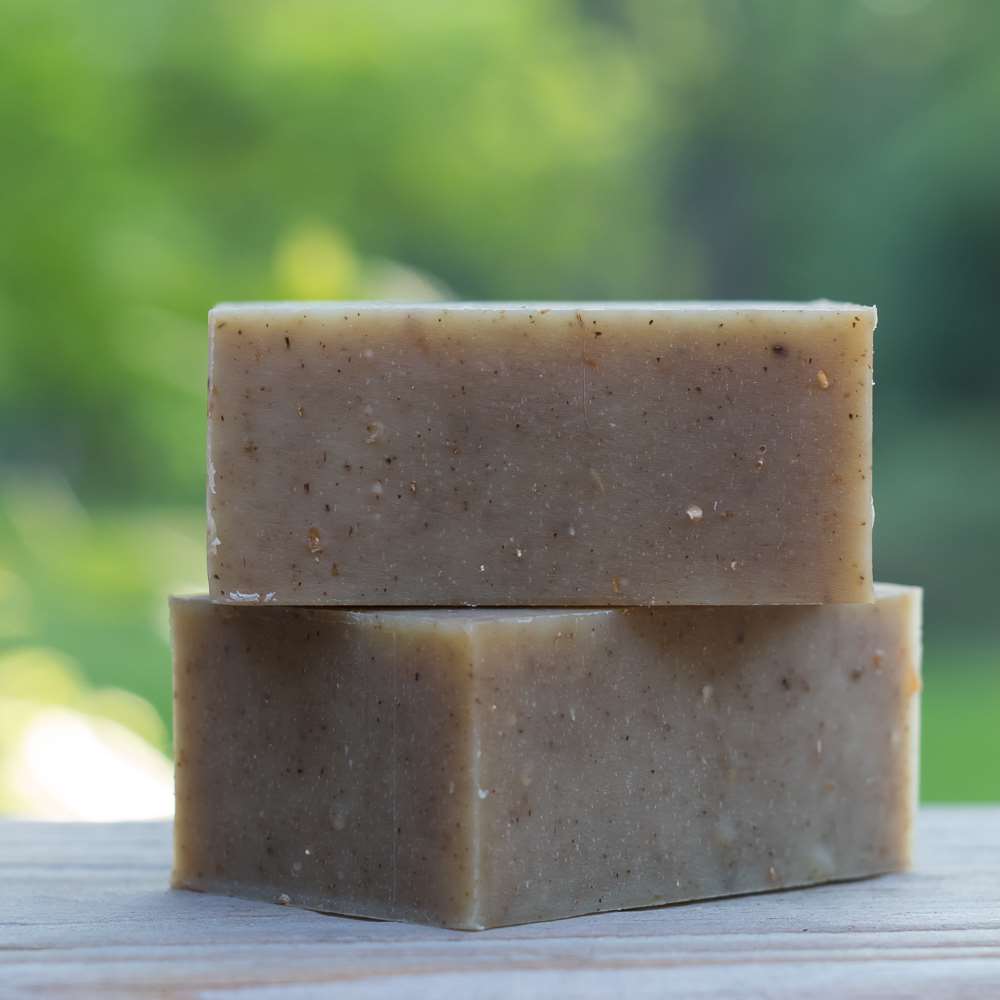
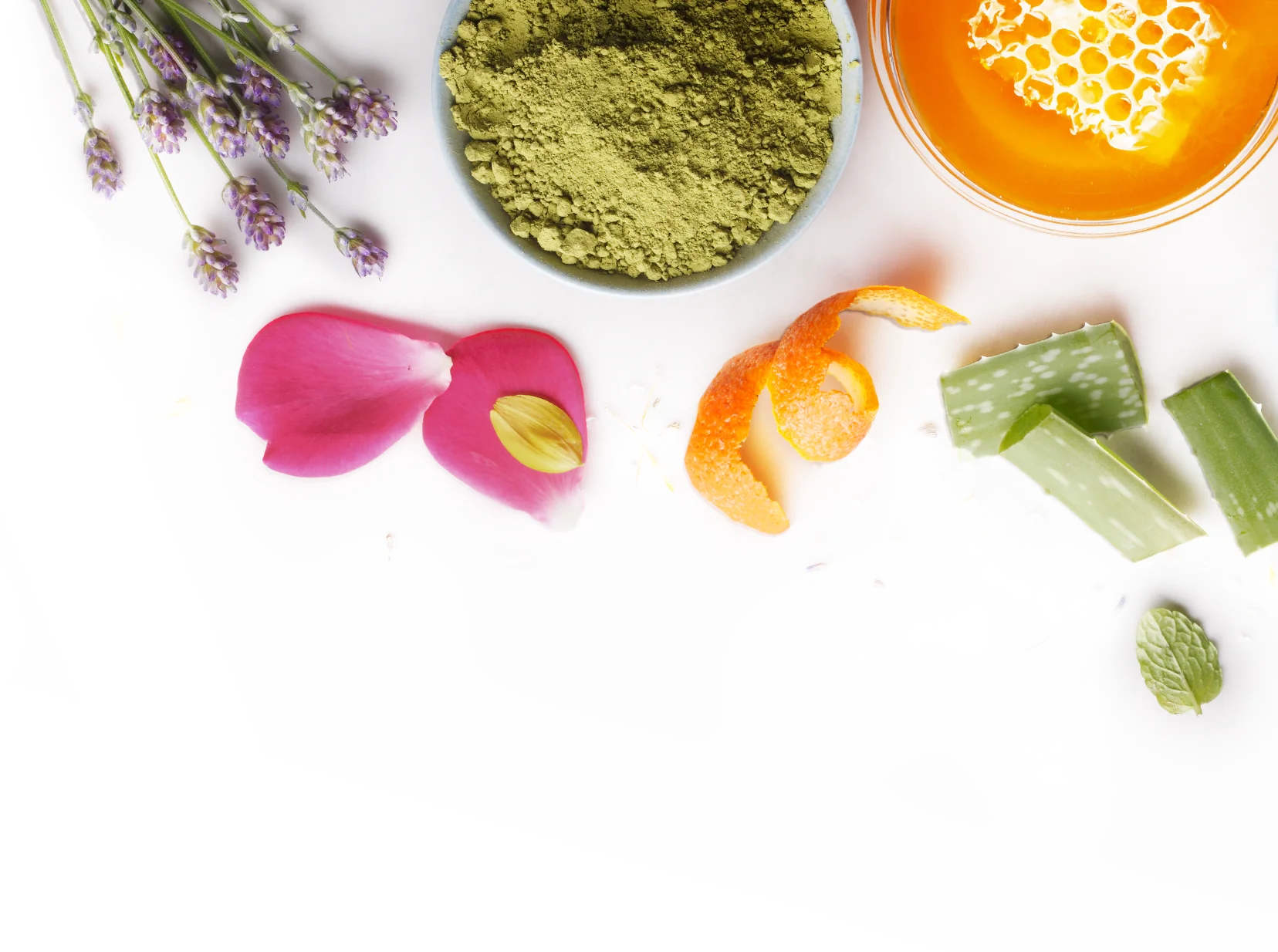
Effective, Feel Good Ingredients
The goal is simple: to Harness the Power & Simplicity of Nature® to cleanse, soothe, heal, and protect your skin and hair!
Our unique formulas rely on moisturizing oils and butters, healing botanicals, and pure essential oils. We choose every ingredient with one end-result in mind….the BEST possible natural skin care for YOU!
Featured Ingredients

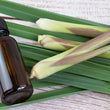
Organic Citronella Essential Oil
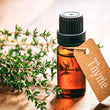
Organic Thyme Essential Oil
All Ingredients:
|
*Ingredient is Fair Trade Certified ^Used in the saponification process to turn oil into soap and glycerin. None remains in the finished product.
Made with Organic Sunflower Oil, Cocoa Butter & Oats
|
Frequently Asked Questions
Biodegradable Soap? Are Chagrin Valley Natural Soaps and Shampoo Bars Biodegradable?
Yes!
Chagrin Valley Natural Soaps Are Made Using Natural & Organic Ingredients and Are Biodegradable!
What Does Biodegradable Mean?
By definition, biodegradable means capable of being broken down by the action of living things, like natural bacteria, into simple substances that are not harmful to the environment.
If You Are A Camper Or Backpacker, Please Read On...
 There are many soap makers out there with good intentions who are claiming that their biodegradable soap or shampoo is safe to use in rivers and streams.
There are many soap makers out there with good intentions who are claiming that their biodegradable soap or shampoo is safe to use in rivers and streams.
Bringing a natural biodegradable soap on your multi-day backpacking trip is a great way to keep yourself feeling refreshed. But, even biodegradable soap can eventually pollute lakes and streams if it is not used properly.
The bacteria that break down natural soap are present mostly in the soil.
That means that even with biodegradable ingredients, you want to use this soap bar away from freshwater sources like lakes, rivers, and streams.
So, please, do not bath, wash your face, or do your dishes, even with biodegradable soap, in any river, lake, or stream.
Some suggestions
- Use a bucket to bring your water to an area at least 200 feet away from all sources of fresh water.
- Lather up sparingly.
- Always dispose of the grey water into the soil (NOT the water source). It is also best not to pour the entire soap solution in one spot. So, you can:
- Sprinkle small amounts of grey water in a wide arc (imagine slinging the water out of your pot, as opposed to pouring it).
- Or dig a small hole (like a cathole) in which to pour the soapy water. The idea is to surround the soap with the organic soil compounds that not only helps speed up decomposition, but also helps prevent surface runoff when it rains.
Is Natural Soap Really Better for Camping?
Absolutely! Commercial soaps, body washes, shampoos, and dish soap contain synthetic ingredients. Many of these ingredients include artificial colors and scents, detergents, and chemical preservatives, such as parabens, phthalates, and petrochemicals. These chemicals do not break down quickly.
Traces of these chemicals will remain in nature for many, many years and can have a potential negative impact on plants and animals.
A biodegradable natural soap is made with natural, organic ingredients that break down efficiently when exposed to the bacteria found in the soil.
There’s no substitute for nature. Together we can protect it from impacts like overuse, trash, and harming endangered wildlife by following the principles of "Leave No Trace."
View Answer Page
Why Choose Chagrin Valley Natural Soaps
Aren't all handmade natural soaps the same? . . .
The answer is NO!
 Saying a soap is "handmade" says nothing about quality of the ingredients or the knowledge and skill of the soapmaker!
Saying a soap is "handmade" says nothing about quality of the ingredients or the knowledge and skill of the soapmaker!
Chagrin Valley is not just another soap and skincare company. We are committed to healthy skin, healthy people and a healthy planet.
We are a USDA Certified Organic Company specializing in luxurious, organic, handmade natural soaps and shampoo bars rich in natural glycerin for healthier skin and hair.
It's all about the ingredients! Inspired by our love of nature, we use organic herbs, seeds, flowers, vegetables, fragrant spices, fruits, pure essential oils and purifying clays for their exceptional skincare benefits and to provide natural color, aromatherapy, texture, or gentle exfoliation. Nothing artificial, nothing synthetic, no GMO’s, just natural wholesome ingredients.
Chagrin Valley's Natural Soap & Shampoo Bars Are...
- all natural
- made with USDA Certified Organic ingredients
- handcrafted in small batches using the old-fashioned Cold Process Method
- made with sustainable and fair trade ingredients
- certified cruelty-free
- free of detergents
- free of synthetic fragrances
- free of synthetic colors
- free of artificial preservatives
- free of artificial foam boosters
- free of alcohol and petroleum products
- free of synthetic additives
- free of GMOs
- biodegradable
- mild and nourishing
- rich in natural glycerin
- magnificent long-lasting lather
- cured for 8 to 10 weeks
Our soap making process uses only natural and organic ingredients. Why add artificial ingredients to a handmade product?

"Are All Handmade Soaps The Same?"
"12 Reasons to Use Natural Soap"
View Answer Page
Why Does the Smell of Natural Soap and Shampoo Bars Made with Essential Oils Change?
My natural soap bar doesn't smell the same as the last one
We sometimes receive emails that go like this:
-
I just reordered [some soap]. It is my favorite bar but it does not smell the same. Did you change the recipe?
- This name of this bar is "lavender . . . " but I smell more of the other essential oils than lavender. Why do you call it lavender?
The good news is that when you purchase natural soap from an organic skincare company, it is scented with only pure essential oils.
The bad news is that when you purchase natural soap from an organic skincare company, it is scented with only pure essential oil.
The scent of an essential in any totally natural product can and will change over time and from batch to batch.
Essential Oils are a Natural Ingredient
Essential oils come from nature. The quality and scent of essential oils are affected by yearly weather conditions and varies from crop to crop and region to region.
This makes it very difficult to produce finished products in which the scents are always exactly the same.
Most commercial soaps (and skincare products), even some of the "natural" ones that contain some essential oils, are made with at least some synthetic fragrances oils, nature identical oil, or natural fragrance oil. Using any synthetic fragrance ensures a more consistent scent.
Essential oils are temperamental to work under any circumstance. But while a natural essential oil scent blend may change a bit in a cream or oil, these blends are especially unpredictable when making cold processed natural soap.
After all my years of soap making in never ceases to amaze me just how much the actual soap making process changes the scent of an essential oil blend.

Natural Soap and Essential Oils
Why We Use Only Real Plant Essential Oils?
Natural Fragrance Oil? . . . Really?
Why Are Synthetic Fragrance Oils So Popular?
View Answer Page
Don't I need to use antibacterial soap to protect my family from germs?
The Short Answer
NO! Adding antibacterial chemicals to soap does not keep your family safe from germs.
I understand why folks (especially those with children) are choosing products labeled “Antibacterial,” hoping to keep their family safe in the war against germs.
According to Janet Woodcock, M.D., director of the FDA’s Center for Drug Evaluation and Research (CDER).
"Consumers may think antibacterial washes are more effective at preventing the spread of germs, but we have no scientific evidence that they are any better than plain soap and water.
In fact, some data suggests that antibacterial ingredients may do more harm than good over the long-term.”
Simply washing your hands with old-fashioned natural soap and water rids your skin of most fungi, bacteria, and viruses. Soap does not kill germs, it surrounds them and carries them away.
The Long Answer
Please read our blog: Antibacterials: More Harm Than Good!
View Answer Page
Do Your Natural Soap And Shampoo Bars Have An Expiration Date?
The Short Answer
Yes And No!
Although handmade natural soaps usually get better with age, we recommend using our soaps within 12 months of purchase. Our scented soaps should be used within 3 months after removing them from the box.
Although the soaps will not be "spoiled" after that time, you may notice some changes as natural soap ages.
- some natural colors may fade over time
- the scents from pure natural essential oil scents will fade over time
The changes in color and scent happen even more quickly in our sample size bars.
These small natural soap bars have a much greater surface area to volume ratio which allows essential oils to evaporate from the surface more quickly. However, the scent may still be there when you lather up.
I have found some ancient bars hiding in my closet that years old. The scents were gone, but the lather was incredible!
The Long Answer
For a more detailed discussion please read our blog, "The Shelf Life, Color & Scent of an All Natural Soap."
How You Can Help Prolong Shelf-Life
-
Natural soaps need to breathe. Exposure to air promotes hardening of your soap and contributes to longer-lasting quality. Soap should be left unwrapped in their boxes or wrapped with breathable materials. Tight wrappers cause humid conditions by preventing evaporation of moisture.
- Our soaps are packaged in breathable, recyclable, sustainable packaging! Keep your natural handmade soaps in a dry, cool place away from sunlight, excessive heat and humidity.
- Our scented soaps, like Lavender Rosemary, can be placed in a muslin bag, old clean sock, or wrapped in a piece of cloth and put in your linen closet or dresser drawer to give a delightful fragrance to your linens and clothes while waiting to be used.
View Answer Page
Is There Lye Your Natural Soap?
Is There Lye In Natural Soap?
 If you are asking the question:
If you are asking the question:
Do you use lye (sodium hydroxide) to make Chagrin Valley natural soap?
The answer is -- yes, of course.
No lye -- No soap!
All REAL soap is made with lye (sodium hydroxide mixed with a liquid).
Any skin or hair cleansing product made without sodium hydroxide is not soap, it is a detergent.
If you are asking the question:
Is there lye in a bar of Chagrin Valley Natural Soap or Shampoo?
The answer is "No."
When the chemical reaction of making soap, called saponification, is complete, the lye and oil molecules have combined and chemically changed into soap and glycerin.
If the soap is made properly, the lye is used up in the saponification process to turn oil into soap.
There is no lye present in the finished bars of soap or shampoo. While all real soap must be made with lye, no lye remains in our finished product after saponification (described below).
But, It Doesn't Say "Lye" or "Sodium Hydroxide" on My Soap Bar Ingredients
If it is real soap or contains read soap, it is made with lye!
Some commercial "soap" bars and all handmade soap bars are made with lye even though the words "sodium hydroxide" or "lye" do not appear on the labels. Does your bar of "soap" contain ingredients such as...
- saponified oils: oils and butters are mixed with sodium hydroxide and a liquid (usually water).
- sodium cocoate: the generic name for the mixture of coconut oil with sodium hydroxide (lye).
- sodium palmate: the generic name for the mixture of palm oil with sodium hydroxide (lye).
- sodium palm kernelate: the generic name for the mixture of palm kernel oil with sodium hydroxide (lye).
- sodium tallowate: the generic name for the mixture of beef fat (tallow) with sodium hydroxide (lye).
- sodium olivate: the generic name for the mixture of olive oil with sodium hydroxide (lye).
These words are not usually used to deceive consumers. But soap makers know that consumers are afraid of the word "lye."
At Chagrin Valley we believe that today's consumers are pretty savvy and the best practice is to educate.

"Is There Lye in Natural Soap? Won't it Harm My Skin? Information about lye and the chemistry of soap making
View Answer Page
